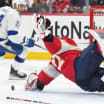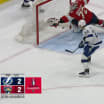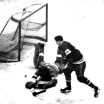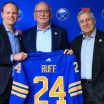Ed Snider, owner of the Philadelphia Flyers since their inception 50 years ago, died Monday at the age of 83.
Snider, one of the most recognizable owners in the NHL, had been battling cancer.
"Ed Snider was the soul and the spirit of the Flyers, who have reflected his competitiveness, his passion for hockey and his love for the fans from the moment he brought NHL hockey to Philadelphia in 1967," Commissioner Gary Bettman said.
Flyers owner Snider dies
Founder remembered as humanitarian, successful businessman
By Brian Hunter @BrianHunterNHL / NHL.com Staff Writer
.@NHLFlyers flag half staff at @WellsFargoCtr #ThanksMrSnider pic.twitter.com/PVaZ9LPkX2
— John Clark (@JClarkNBCS) April 11, 2016
"Ed created the Flyers' professional, no-nonsense culture, fostered their relentless will to win and set the highest standards for every activity on and off the ice, including such initiatives as the Ed Snider Youth Hockey Foundation and the Flyers Wives Carnival. While the loss of Ed Snider tears a hole in the heart of the Flyers and the city of Philadelphia, and leaves a massive void in the city's sports landscape, it also challenges all who knew him to carry forward the great works that are his legacy.
"On a personal note I have valued Ed's counsel, I have admired his philanthropy and truly have cherished his friendship. Ed was an unmistakable presence and an unforgettable personality. Like most people who had the pleasure of knowing Ed, I will miss him terribly.
"As the NHL family grieves Ed's passing, we also celebrate his courage, his vision, his leadership and his commitment to future generations of players and fans. We send our thoughts of compassion, comfort and strength to his family, his friends and all whose lives he touched."
Snider is survived by his six children, Craig, Jay, Lindy, Tina, Sarena and Samuel, as well as 15 grandchildren, and his wife Lin Snider.
"I am overwhelmed by the outpouring of love and admiration for Ed," Spivak said. "He was a man of tremendous vitality. At the core he was a wonderful family man. He loved his children and grandchildren, and they truly loved him. I join them in expressing gratitude today to all of those who have shared their thoughts and feelings about Ed. Our time together, while far too short, was filled with extraordinary moments and wonderful adventures. We loved each other deeply. I will treasure my memories, and will miss him greatly."
Snider's children released a statement Monday: "Our Dad was loved and admired for his big heart, generosity of spirit, and dedication to his family. Despite his considerable business achievements and public profile, he was first and foremost a family man. He never missed a birthday, important family event or the opportunity to offer encouragement. We turned first to him for advice in our personal and professional lives. We grew up tagging behind him in arenas, stadiums and locker rooms; and his players, management and team personnel were our extended family. He treated his employees with respect regardless of rank or position, and the man they called 'Mr. Snider' always would have preferred simply to be called 'Ed.'
"From him we learned the importance of helping others and the value of supporting our community and beyond. He was a man with deep convictions and never hesitated to promote causes in which he believed. His children and grandchildren will continue his philanthropic mission for years to come through the work of the Ed Snider Youth Hockey Foundation and the Snider Foundation. Revered in his adopted city of Philadelphia, we too were captive in the orbit of his brilliant light and magnetic personality.
"During his lifetime, he cultivated a cherished circle of friends whom he loved dearly -- and who loved him back -- whether in Washington, D.C., Monmouth, Maine, Philadelphia or Montecito, Calif. Unrivaled, however, was his love for the Philadelphia Flyers Hockey Club, the team he created 50 years ago and to which he remained fiercely devoted through his final days. With every game during the push to make the playoffs this spring we hoped he would survive to see the Flyers win just one more game. He gave the last ounce of his indomitable energy and strength to live through this hockey season, but now the Flyers must win without him.
"He fought his last years, months and days with courage and grace and recounted his love for many including his Flyers family and fans. We are grateful for the outpouring of love and support from the community, his friends and all those who were fortunate to have been touched by him in some way, large or small."
Bob Clarke, the Hockey Hall of Fame center who captained the Flyers' two Stanley Cup championship team and later served two stints as general manager, told CSNPhilly.com that his relationship with Snider was "somewhere between close friends and father and son. Somewhere halfway in between.
"He was not only a friend but he was a great man. And I know that's been said about lots of people, but those of us who played hockey in Philadelphia know that 'great' does describe him."
The Flyers clinched a berth in the Stanley Cup Playoffs with a 3-1 win against the Pittsburgh Penguins at Wells Fargo Center on Saturday. Prior to the game, anthem singer Lauren Hart had Snider on FaceTime on her mobile phone so he could be part of the pregame festivities.
"If Ed Snider couldn't be in the building, I'm bringing the building to him," Hart told CSNPhilly.com.
A number of Flyers players also said Snider was in their thoughts Saturday.
"You get a little emotional when you start thinking about it," Flyers captain Claude Giroux said. "We know that he's happy we made the playoffs. He's excited. It's going to ... we're definitely playing for him right now."
I feel privileged to have known such a great leader. Rest in peace Mr. Snider, you will be missed.https://t.co/i4lk3BShW8
— Claude Giroux (@28CGiroux) April 11, 2016
Said Flyers president Paul Holmgren: "For all of us, he is the Flyers. He is the face of the Flyers. He is, he was, he always will be."
It was 50 years ago that Snider, Jerry Wolman and others were awarded a "Second Six" expansion team by the NHL Board of Governors. The group paid $2 million for the team and invested $12 million into building the Spectrum, the Flyers' home through the 1995-96 season.
Snider's love of hockey -- "The greatest spectator sport I had ever seen" -- was born from watching a New York Rangers game at Madison Square Garden and his belief that Philadelphia fans would embrace a team. That's what made the Flyers a reality and a success.
"I just had the belief that if you're a regular guy and know what regular guys like, you can't be wrong," Snider said.
He wasn't -- eventually.
A crowd of 7,812 came to the Spectrum for the first home game in Flyers history, and though they finished first in their inaugural season in the West Division (established for the six expansion teams that began play in 1967-68 and where the Flyers remained until moving into the Patrick Division in 1974-75), part of the covering on the roof of the arena blew off during a storm and the Flyers were forced to relocate their home games for more than a month.
The Flyers made the Stanley Cup Playoffs in three of their first five seasons but failed to win a round. During that time, the Spectrum went into bankruptcy, and though Snider was trying to establish firm footing with the Flyers, he gambled again and took over control of the arena from Wolman, along with its $8 million debt.
"I did it because I believed that the Flyers and the Spectrum could not fail," Snider told the Philadelphia Inquirer in 1986. "I knew if I worked hard, stuck it out, that I would succeed. Thank God that's what happened."
The Flyers, known as the Broad Street Bullies for their style of play, would become the first expansion team to win the Stanley Cup, doing it in the 1973-74 season. They won the Stanley Cup again the following season.
Snider's influence as a businessman went beyond the realm of hockey; he was the longtime chairman of Comcast Spectacor, the sports and entertainment company that controlled the Flyers and Philadelphia 76ers of the NBA; the arena they played in, Wells Fargo Center; and the regional sports network that televised their games.
"This is a very sad day for Ed's family, the Flyers, Comcast Spectacor and his many fans in Philadelphia," said Brian L. Roberts, chairman and CEO of Comcast Corp. "Our business partnership lasted more than 20 years, which seemed improbable at the time, and ultimately transcended into a cherished and special friendship. We are so sad but relish the many accomplishments Ed achieved during his amazing lifetime. He was completely unique, incredibly passionate and will be terribly missed."
Born Jan. 6, 1933, in Washington, D.C., Snider was the son of a successful grocery-store chain owner and earned an accounting degree from the University of Maryland. After briefly working as a certified public accountant, he became the first president of the National Association of Record Merchandisers. His company, Edge Enterprises, went national before Snider sold it for a significant profit.
Soon after, he joined his brother-in-law, Earl Foreman, and Washington-area builder Wolman in purchasing the Philadelphia Eagles of the NFL, taking over the business operations.
"Ed was a true visionary and a pioneer who did tremendous things for our city and for the sport of hockey," current Eagles owner and CEO Jeffrey Lurie said. "He was driven by a relentless pursuit of winning and his passion for the sport was genuine. That's one of the reasons I think he was so loved and respected by the fans of our city and by his players and staff. They knew he cared just as much as they did.
"Under Ed's guidance the Flyers became one of the most consistently successful franchises in the NHL, and he used his leadership to help foster a classy organization across the board. But perhaps more than anything, I think the legacy that Ed will leave behind is his commitment to helping young people in our city succeed in life through his youth hockey foundation. Our thoughts are with his family and the entire Flyers organization during this difficult time."
The Philadelphia Phillies, who will play their home opener Monday against the San Diego Padres, announced they will have a moment of silence to honor Snider.
Snider eventually created Spectacor as a holding company for the Flyers and the Spectrum. Spectacor would be responsible for creating the regional cable sports network PRISM, and WIP, which became the first all-sports-talk radio station.
Those who spoke about Snider in the Inquirer story -- during a period when the Flyers were between two appearances in the Stanley Cup Final in a three-year span -- painted the picture of a driven man who was tough but had a softer side and desire to do good within his community.
"In addition to being smart, he's got the courage to forge ahead with an idea he believes in despite the risks," said Bill Giles, one of Snider's contemporaries as president of the Philadelphia Phillies of Major League Baseball.
John Ziegler, then president of the NHL, said, "Ed Snider is a humanitarian who has won the respect and admiration of everyone who knows him."
In 1972-73, the Flyers' sixth season, they won a playoff series for the first time, defeating the Minnesota North Stars before losing to the Montreal Canadiens. The building blocks for a champion were in place, and the re-acquisition of goaltender Bernie Parent during the offseason sparked Philadelphia to Stanley Cup victories against the Boston Bruins in 1974 and the Buffalo Sabres in 1975. The Flyers lost in the Final to Montreal in 1976 and to the New York Islanders four years later.
With Snider as owner, the Flyers made four additional Cup runs but did not win, losing in the Final to the Edmonton Oilers in 1985 and 1987, the Detroit Red Wings in 1997, and to the Chicago Blackhawks in 2010 to end a run as a seventh seed that qualified for the playoffs by winning a shootout on the final day of the regular season.
"It just seemed like he cares so much about the players and the team and it seemed like he enjoyed the season, seeing his team do well and to be around," former Flyers forward Daniel Briere said. "He's always there, he's always on top of things and he really knows what's going on."
Snider was about more than sports; he was a founding member of the Institute for Cancer and Blood Diseases at Hahnemann University Hospital and a member of the board of the National Museum of American Jewish History.
During his later years, he created the Ed Snider Youth Hockey Foundation, which used hockey as a base to teach inner-city children important life skills and provide educational assistance. In 2008, a $6.5 million donation by Snider helped save three city-owned public skating rinks and made them operational on a year-round basis.
"Hockey is the greatest game ever invented, and my hope is to provide a chance for a whole new generation of children to learn and play the game," Snider said when the Foundation was created. "Through hockey, I want our participants to be able to learn about life, achieving successes and scoring goals, not just on the ice, but in life."
Snider preferred to remain behind the scenes in his charitable endeavors, wanting to leave behind something that would stand as a mark to how much he came to care about the sport of hockey.
"The rinks are the only thing I've put my name on," he told the Philadelphia Daily News during a 2011 interview. "And the reason I did is that I want them to be my legacy, when I'm gone. They're very important to me."

















